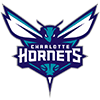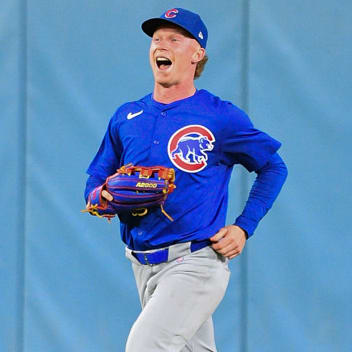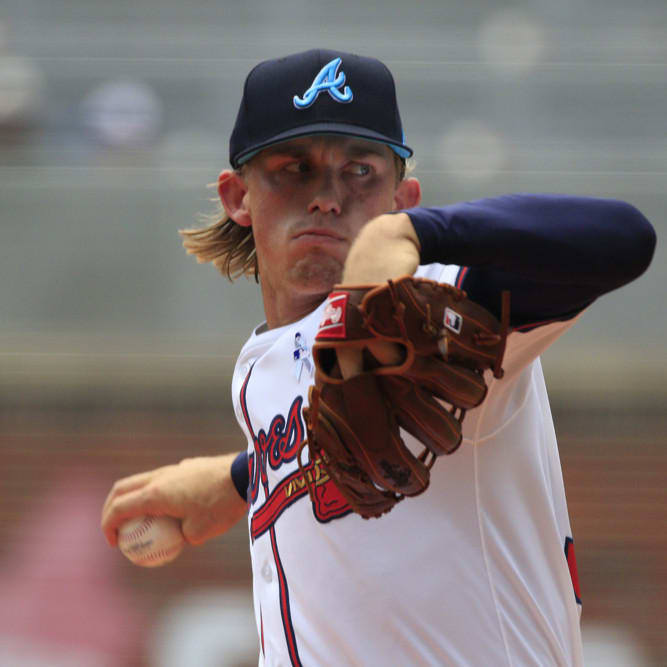Baseball tends to be a sport which loves to play copycat. One team finds success in a new manner and other teams will quickly attempt to mimic that method to find their own success. This season, a few teams have found success converting relievers into effective starting pitchers, surprising many of us with just how effective these pitchers have been in making the move from the pen to the rotation. We typically see many pitchers make successful conversions from unimpressive starters to effective relievers, but rarely do we see pitchers flip that script.
C.J. Wilson infamously made the change from a middle reliever whose effectiveness varied from 2005 through 2009 to an effective starting pitcher who worked four consecutive 200-inning seasons from 2010 to 2013. Wilson set a high bar that few pitchers have been able to replicate since, but this year, we've seen several former relievers have successful first halves as starters after working as relievers in previous seasons.
Seth Lugo trails only Tarik Skubal in earned auction value for starting pitchers in standard 12-team scoring formats, earning $29 to date. Lugo actually began his transition from the pen last season with San Diego, but I want to reference that situation later. Garrett Crochet is just one of eight pitchers to earn at least $20 of fantasy value to date. Ronel Blanco has converted from a major-league reliever to a top 12 starting pitcher, while Reynaldo Lopez has come off three consecutive season of effective relief work to be
Baseball tends to be a sport which loves to play copycat. One team finds success in a new manner and other teams will quickly attempt to mimic that method to find their own success. This season, a few teams have found success converting relievers into effective starting pitchers, surprising many of us with just how effective these pitchers have been in making the move from the pen to the rotation. We typically see many pitchers make successful conversions from unimpressive starters to effective relievers, but rarely do we see pitchers flip that script.
C.J. Wilson infamously made the change from a middle reliever whose effectiveness varied from 2005 through 2009 to an effective starting pitcher who worked four consecutive 200-inning seasons from 2010 to 2013. Wilson set a high bar that few pitchers have been able to replicate since, but this year, we've seen several former relievers have successful first halves as starters after working as relievers in previous seasons.
Seth Lugo trails only Tarik Skubal in earned auction value for starting pitchers in standard 12-team scoring formats, earning $29 to date. Lugo actually began his transition from the pen last season with San Diego, but I want to reference that situation later. Garrett Crochet is just one of eight pitchers to earn at least $20 of fantasy value to date. Ronel Blanco has converted from a major-league reliever to a top 12 starting pitcher, while Reynaldo Lopez has come off three consecutive season of effective relief work to be one of the most dominating starters in the National League this season.
Each of these pitchers are very likely an integral part of successful fantasy teams given the return on investment compared to their acquisition costs in drafts, but the story is not yet complete. Baseball annals have many examples of first half glory becoming second half disasters. The first one of those I recall is the 1990 season of Jack Armstrong.
Armstrong went 11-3 with a 2.28 ERA and a 1.10 WHIP in the first half of the season for that improbable Cincinnati club and made the midsummer classic as well. He limped to the finish line, posting a 1-6 record after the break with a 5.96 ERA and a 1.64 WHIP. Armstrong joined the organization in 1987 out of The University of Oklahoma and worked 56 innings that season. He worked 185.1 innings in 1988 between Triple-A and the majors and then worked 223.1 innings in 1989. Unlike the three names discussed earlier in this article, Armstrong was used purely as a starter, but that workload as well as regression may have finally caught up with him all at once in the summer of 1990, as his season went from promise to peril. I'd like to look at Crochet, Blanco and Lopez to see what the second half could potentially have in store for the surprising trio.
By Innings Workload
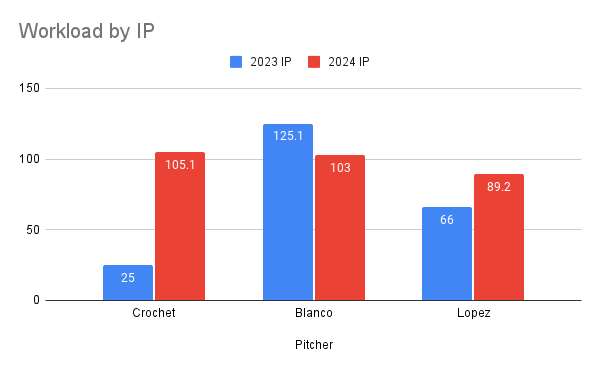
Crochet is obviously the biggest concern given that his current innings total is a 321 percent increase over last season as he began his way back from Tommy John surgery. Crochet has already exceeded the workload that many expected from him this season, and even if Chicago cashes in and sells Crochet at his current value, his new employer will likely be cautious with the talented lefty's innings the rest of the season. Crochet was often compared to Chris Sale on his way up the organizational ladder, and he's certainly pitched like peak Sale this season to date, even if his 6-6 record doesn't reflect that.
Lopez has seen a 36 percent increase his workload over last season as he toiled in middle relief for three different clubs in 2023 before Atlanta gave him a chance to return to a starting role. A big workload is not unchartered territory for Lopez, who worked over 180 innings in both 2018 and 2019, but he hadn't thrown even 70 innings since then until this season. Lopez, at age 30, is not in the same area of risk as Crochet.
Blanco is also a 30 year old pitcher, but unlike the other two pitchers, he is actually pacing a bit behind last season's workload since he served as a starter in Triple-A and mostly in a swingman role with Houston. Last season's total was easily Blanco's career high in innings, and he appears primed to surpass it by month's end.
Back to Lugo: he made his adjustment last year, and his second-half numbers showed no signs of wear when many (myself included) were worried about his workload catching up to him.
By Pitch Count
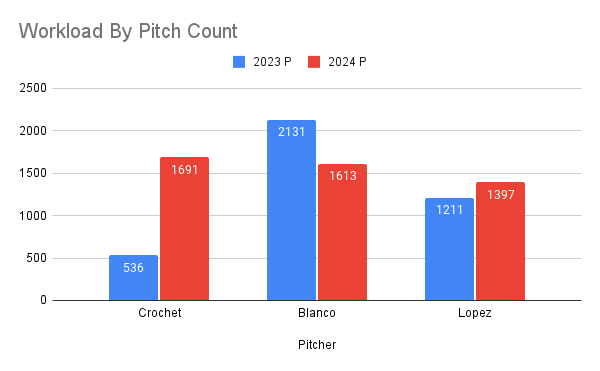
The reason for including pitch count is a reminder that not all innings are created equally. An inning by Seth Lugo, for example, often looks very different than an inning from Blake Snell or Jordan Montgomery this season. Crochet, while seeing a 321 percent increase in innings, has merely a 215 percent increase in his pitch count. This doesn't mean that he's not at risk from extra management the rest of the way, but it shows that he has been more efficient with his pitches as his pre-surgery command returns.
Lopez has seen just a 15 percent increase in his pitch count to date, as he's reduced last season's problematic walk rate and his propensity to pitch deep into counts. Blanco is currently 24 percent behind last year's pitch count, which is better than the 17 percent difference in his innings load because he, too, is throwing more strikes this season.
Other Factors
PITCHER | BABIP | LOB% | HR/FB | xERA | K-BB% |
|---|---|---|---|---|---|
Crochet | 0.292 | 75.% | 11.0% | 2.47 | 29.3% |
Lopez | 0.269 | 89% | 6.3% | 4.26 | 16.4% |
Blanco | 0.184 | 87% | 12.7% | 3.61 | 13.5% |
Choose your own adventure time? Crochet would be the safest play moving forward if everything was solely based on this table, as he has the best story to tell statistically. He's pitching to his true talent level and isn't getting exceedingly lucky anywhere here. I just do not perceive a scenario where the White Sox or a playoff contending employer is going to let him work untethered the rest of the way. I can only offer to continue to enjoy the ride while it lasts, because it will be workload management and not regression that ultimately brings him down.
Lopez, however, is a different story. His outcomes have exceeded his indicators even if he has yet to show any signs of allowing the regression monster to catch up with him. His current home run to fly ball ratio is well below his career figure of 10.8 percent, but Lopez also showed in 2022 that he's capable of some serious home run suppression when he allowed one home run in 65.1 innings of work. That regressed in 2023, as he allowed eight homers in nearly the same amount of innings, so this bears watching in the second half as the weather continues to sit near triple digits on a daily basis in his home ballpark.
Blanco, thanks in part to his no-hitter, has enjoyed the most batted ball fortune of the trio, which has helped keep his actual ERA more than a full run below his expected one. The foundational skills here remain questionable moving forward, but nine wins, a 2.53 ERA and a 0.99 WHIP is much more than most anyone expected from the pitcher before the season.
The sell-high advice would apply here in the olden days, but today's fantasy managers are more skeptical and knowledgeable about such perils, making it tougher to move any one of these pitchers for the return you want for your team. I would fully support moving any one of these pitchers, but I would also advise you not to be too greedy in what you seek in return. Your roster likely has needs, so focus on acquiring players for that specific categorical need rather than attempting to achieve equal value for what one of these pitchers has produced so far this season. Odds are none of them will be able to maintain their first half production for one reason or another.
















